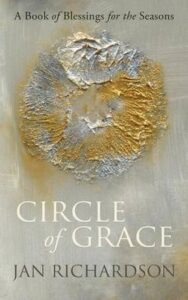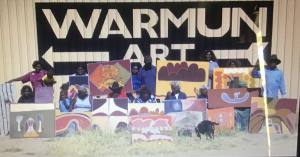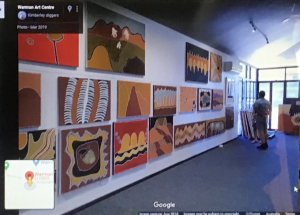Mabo Day 2020
June 3, 2020We commemorate Mabo Day on 3 June to honour the courageous efforts of Eddie Koiki Mabo to overturn the fiction of terra nullius (land belonging to no-one).
Quote from a manifesto prepared for the Mabo Court Case

As we honour the life and work of Mr Edward Mabo, let’s consider the prosperity of many of us, and the dispossession, poverty, homelessness, hunger and early deaths of many Aboriginal and Torres Strait Islander (First Nations) people across Australia. First Nations People held the sovereign rights and cared for our country for thousands of years before colonisation. In the name of the British government Captain James Cook took the east coast of Australia in 1770, and for the next hundred years the entire country became crown land and was either leased, sold or granted to colonists.
As I wrote this reflection, I became aware of an open wound in Australia, and across the world, and all of us, as one body, holding the wounded one. Together birthing a love, we have longed for, but have never expressed in our social, legal and political systems. When I saw this beautiful icon by Mary Southard I was moved to deep compassion. Eddie Mabo spent many years of his life longing for and working for justice for his people. Let’s honour his life work today by caring deeply for what he cared for – simple justice, compassion and humanity for his people.
There is evidence in the Letters Patent promulgated by the British Parliament (1834), a situation in Port Philip Bay in Victoria (1835) and in the words of Julian Tenison Woods (1880) that us newcomers knew the country belonged to the first inhabitants and it was absolutely wrong, and to our shame, that we stole their land without fair compensation.
King William IV Letters Patent read on Proclamation Day in South Australia guaranteed that”
Letters Patent promulgated in the British Parliament in 1834
In 1835 a pioneer grazier and explorer, John Batman used a treaty to buy land around Port Phillip Bay (present-day Melbourne) directly from the First Nation inhabitants.
Julian Tenison Woods, co-Founder of our Congregation, wrote to the Sunday Mail in 1880:
Sydney Mail 17 July 1880 p 102
Please continue reading below:
Please read the entire article here (PDF)
Kenise Neill rsj
Media Release: Plenary Council Discernment Papers
June 1, 2020Plenary Council 2020
As defined on the Plenary Council 2020 website:
 In the lead up to the Plenary Council 2020 Assembly 1 (which has been postponed until October 2021 due to COVID-19), there were two phases of listening.
In the lead up to the Plenary Council 2020 Assembly 1 (which has been postponed until October 2021 due to COVID-19), there were two phases of listening.
To find out more about the Plenary Council 2020, you can visit the:
Additionally, please find below the latest Plenary Council 2020 Media Release.
Media Release: Discernment Papers Help Sharpen Focus for Plenary Council
Archbishop Timothy Costelloe SDB says the six discernment papers for the Fifth Plenary Council of Australia signify the latest milestone as the Church considers its present circumstances and discerns its future.
Six Discernment and Writing Groups, one each for the six national themes for discernment that emerged from the Council’s Listening and Dialogue phase, were tasked with writing papers to bring some major themes and issues into focus…
You’re invited to continue reading the Media Release below:
Bread of Life for the World
Elaine Wainwright* offers an ecological reading of two extracts from John’s Gospel — John 3:16-18 and John 6:51-58.
 Reading the biblical text ecologically is an engaging task. Our current context for this engagement is a world in crisis as the global pandemic coronavirus brings death to the human community. And in this context we can be isolated from our faith communities and the usual proclamation of the Scriptures in liturgies in church.
Reading the biblical text ecologically is an engaging task. Our current context for this engagement is a world in crisis as the global pandemic coronavirus brings death to the human community. And in this context we can be isolated from our faith communities and the usual proclamation of the Scriptures in liturgies in church.
The context is changed radically from a few weeks earlier. Now Earth itself, together with its human and other-than-human population, is groaning. That can be understood as groaning in pain and loss. But it may also be what Paul describes as a “great act of giving birth” (Romans 8:22-23) — birth into a new way of being for the cosmos and all that inhabit it…
Continue reading the article below:
Tui Motu Issue 249, June 2020 (PDF)
Pentecost 2020
May 31, 2020Jan Richardson, an artist, writer, and ordained minister in the United Methodist Church serves as director of The Wellspring Studio, LLC, and has travelled widely as a retreat leader and conference speaker. Below is her offering for Pentecost…
 Acts 2.3-4
Acts 2.3-4
If we didn’t know it before, we surely know it now, as the second chapter of Acts unfolds: this is no tame God who comes to us, no safe and predictable deity. This is the God whose loving sometimes takes the form of scorching.
Before he left, Jesus told his friends he would send them the Advocate, the Comforter. Now we see this Comforter coming as wind, as flame, reminding us that comfort is not always comfortable, for it makes itself known in community, where we find the most searing challenges—and the deepest blessings—we will ever know.
This Graces That Scorches Us: A Blessing for Pentecost Day
Here’s one thing
you must understand
about this blessing:
it is not
for you alone.
It is stubborn
about this.
Do not even try
to lay hold of it
if you are by yourself,
thinking you can carry it
on your own.
To bear this blessing,
you must first take yourself
to a place where everyone
does not look like you
or think like you,
a place where they do not
believe precisely as you believe,
where their thoughts
and ideas and gestures
are not exact echoes
of your own.
Bring your sorrow.
Bring your grief.
Bring your fear.
Bring your weariness,
your pain,
your disgust at how broken
the world is,
how fractured,
how fragmented
by its fighting,
its wars,
its hungers,
its penchant for power,
its ceaseless repetition
of the history it refuses
to rise above.
If you still have the courage, you might like to pray this version of the Pentecost sequence penned by Susan Connolly rsj
Please continue reading Jan Richardson’s and Susan Connolly’s Poems here (PDF)
Frances Maguire rsj
© Jan Richardson. www.janrichardson.com Circle of Grace: A Book of Blessings for the Seasons. Used with permission.
Pentecost Message
Greetings for the feast of Pentecost.
Congregational Leader Sr Monica Cavanagh, has provided a message for Pentecost in the video below:
Additionally, you’re invited to view a message for Pentecost from the Congregational Leadership Team below:
Mount St. Joseph’s Girls’ College Excels
May 26, 2020We are proud to announce that Mount St. Joseph Girls’ College Altona, Victoria was recently named winner of the 2020 Schools that Excel for non-government schools in Melbourne’s West.
This award was based on the outstanding VCE/ATAR results over the past 10 years.
You can read more about it in this article from The Age newspaper below:
‘Schools that Excel: Winners in the west’ article
Nicole Magee
Marketing & Communications
Mount St. Joseph Girls’ College
National Sorry Day 2020
Sorry Day has become part of the calendar of commemorations that challenge us to reflect on our colonial history, as well as our present-day attitudes to our Indigenous brothers and sisters.
The formal National Apology given by then Prime Minister Kevin Rudd on 13 February 2008, brought a great sense of catharsis, relief, satisfaction, as though at last, the wrongs of the past were being exposed and confessed. As I look back on the You Tube video of that day on 13 February 2008, I am moved to tears because of the tears flowing on the faces of the Indigenous people, gathered in and outside Parliament.
 Part of our ongoing atonement is the observance of National Sorry Day on 26 May each year. This day was inaugurated in 1998, one year after the tabling of a report about the removals of Aboriginal and Torres Strait children from their families.
Part of our ongoing atonement is the observance of National Sorry Day on 26 May each year. This day was inaugurated in 1998, one year after the tabling of a report about the removals of Aboriginal and Torres Strait children from their families.
As well as being a day of repentance for the cruel injustices of the past, it is a day that highlights some of the wonderful achievements of Aboriginal people in numerous fields of endeavour, The Arts, Music, Dance, Poetry, Theatre, Comedy, Law, Education, Medicine, Health, Literature, Painting, Traditional Languages, Bush Knowledge, Care of Land.
In some circumstances of our everyday lives, the word ‘sorry’ is not easily said, but once it is uttered with sincerity, a way is open for reconciliation, for a more genuine encounter with the other, for ongoing acceptance of mutual shortcomings. To say sorry is to trust oneself and one’s story to the other’s understanding. The genuine encounters of each day in the flow of what happens, leave space for people to grow and accept one another’s limitations. Reconciliation is happening in this gradual and sometimes painful way.
As I reflect with Sisters who work closely with Aboriginal people in remote communities and in urban parishes and settings, I hear them attest to this honesty and mutuality in their relationships. Genuine appreciation of one another, being sorry and saying sorry weave through the ups and downs of everyday encounters. This is reconciliation in the everyday; part of being immersed in ’the smell of the sheep’. It happens on the verandahs, in the Community, the classrooms, the roads, on the bush trips, in the office, the shop, the Art Centre, in times of death, grief and loss, imprisonment and release, resolving conflict, in the talking circle, sitting around corroborees, songs and stories, women’s and men’s business shared and honoured.
 Specifically, targeted programmes can be very beneficial in healing the traumas, and consequent violent behavior, carried from the cruel practices inflicted on past generations. ‘Healing the Cause of Violence Programme’ organised by Sr Alma Cabassi, for the people of Halls Creek and Balgo, is one such programme. This has been run with the support of small grants from Mary MacKillop Today and currently a significant grant from The West Australian Police Force. The sessions are conducted by an experienced psychologist, who presents learnings that help people understand the cause of their reactions and violent behaviours. This programme suits Aboriginal learning styles, Sr Alma says, as it includes illustrations and stories.
Specifically, targeted programmes can be very beneficial in healing the traumas, and consequent violent behavior, carried from the cruel practices inflicted on past generations. ‘Healing the Cause of Violence Programme’ organised by Sr Alma Cabassi, for the people of Halls Creek and Balgo, is one such programme. This has been run with the support of small grants from Mary MacKillop Today and currently a significant grant from The West Australian Police Force. The sessions are conducted by an experienced psychologist, who presents learnings that help people understand the cause of their reactions and violent behaviours. This programme suits Aboriginal learning styles, Sr Alma says, as it includes illustrations and stories.
Please continue reading below:
Read the entire article here (PDF)
Margaret Keane rsj
54th World Communications Day 2020
May 24, 2020When we look back at 2020, we will recall how the year began with the daily news focussed on the devastation caused by the bushfires burning across our country.
 Meanwhile, silently, a new danger threatened, one that would call forth reserves of courage and commitment from us all. We will look back and remember media reports that highlighted the best and at times the worst of humanity. We will remember the selfless dedication of emergency workers who put their lives on the line, and we will be grateful that our media outlets offered timely and factual communication to assist in managing bushfire evacuations and the COVID-19 lockdowns.
Meanwhile, silently, a new danger threatened, one that would call forth reserves of courage and commitment from us all. We will look back and remember media reports that highlighted the best and at times the worst of humanity. We will remember the selfless dedication of emergency workers who put their lives on the line, and we will be grateful that our media outlets offered timely and factual communication to assist in managing bushfire evacuations and the COVID-19 lockdowns.
Pope Francis, in his letter for World Communications Day 2020 chose the theme:
Life becomes history
Little would he have known that his letter, written in January before the world had woken to the gravity of the situation we were about to face, directs our attention to the importance of storytelling. Pope Francis states, …
 The lack of opportunity to celebrate at Easter and ANZAC Day due to the pandemic lockdown brought us together in new ways as communities of faith and belief. Once again, the media played an important role in bringing these new ways into the intimacy of our own living rooms. We began to discover that we were not isolated, but instead, were part of a global community that could give honour and praise and celebrate the beliefs and values at the heart of our community. Time will tell if these new ways will become woven into the fabric of our lives and culture.
The lack of opportunity to celebrate at Easter and ANZAC Day due to the pandemic lockdown brought us together in new ways as communities of faith and belief. Once again, the media played an important role in bringing these new ways into the intimacy of our own living rooms. We began to discover that we were not isolated, but instead, were part of a global community that could give honour and praise and celebrate the beliefs and values at the heart of our community. Time will tell if these new ways will become woven into the fabric of our lives and culture.
Pope Francis reminds us that in Jesus God intervened in human history and reworked the fabric of human life.
As we celebrate World Communications Day 2020, we thank God for the media that has helped us retell our stories. We pray that those entrusted with this sacred duty will do so with integrity and honesty for the sake of the common good and be fearless in standing with the vulnerable and those most in need.
Mary Ellen O’Donoghue rsj
Image: Digitization Transformation by Gerd Altmann obtained from Pixabay. Used with permission.
Image: Pope Francis by Annett_Klingner obtained from Pixabay. Used with permission.
